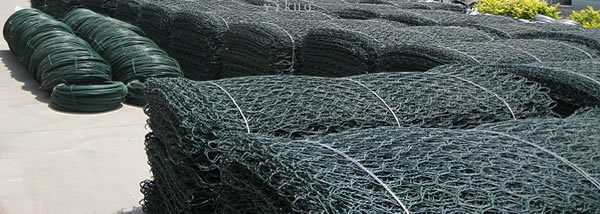All wire used in the fabrication of the gabion and in the wiring operation during construction shall be in accordance with BS 1052 and shall be mild steel wire having a tensile strength of 380MPa-500MPa and a minimum elongation at failure of 12%. The sizes of the wires shall be in accordance with the table below.
All wire shall be galvanised to BS 443 1982 'Zinc coatings on steel Wire' with the minimum weight of zinc coating in accordance with the table below.
| diameter(mm) |
zinc coating g/m2 |
|
| Mesh wire | 2.7 | 260 |
| Binding and Bracing wire | 2.2 | 240 |
| Selvedge wire/Edge wire | 3.4 | 275 |
All wire used in the fabrication of gabions and in the wiring operations during construction shall, after galvanising, have extruded onto it a coating of polyvinyl chloride compound referred to as PVC. The coating shall be not less than 0.4mm thickness and shall be capable of resisting effects of exposure.
The PVC material shall meet the following specifications and resistance to ageing:
- Specific Gravity: between 1.35 +/- 0.05 in accordance with ASTM D 792-91;
- Tensile Strength: shall not be less than 21 Mpa according to ASTM D 412-92 & BS 2571-Type E1
- Elongation: between 200% and 280%, when tested in accordance with ASTM D 412-92 & BS 2571-Type E1
- Volatile Loss: at 105°C for 24 Hrs. Max. 2% & at 105°C for 240 Hrs. Max. 6%, as per ASTM D 2287-92 & ASTM1203-67;
- Modulus of Elasticity at 100% Elongation: shall not be less than 21.6 Mpa as per ASTM D 412-87;
- Resistance of Abrasion: The loss of weight shall not be greater than 0.19 g as per ASTM D 1242-56 (75), testing method A;
- Creeping Corrosion: shall not greater than 25mm from a square cut end when immeresed for 100 hrs. in a 50% solution of HCL.
- Resistance to crack or split of PVC: No Hydrogen shall occur on the wire surface when the specimen has been immeresed for 48 hrs. in a 50% solution of HCL.
Testing for Deterioration are as follows:
- Salt spray: test period = 1500 hours, as per ASTM-B 117-90.
- Exposure to UV rays: test period = 2000 hours at 63 C, as per ASTM D 1499-92 and ASTM G 23-93 apparatus type E.
- Exposure to high temperatures: testing period = 240 hours at 105°C, when tested in accordance with ASTM D 1203-89 and ASTM D 2287-92.
The PVC will be considered suitable if after these tests, the variations from the initial specifications listed above are as follows:
- No cracking, stripping or air bubbles, and no appreciable variation in colour;
- Specific Gravity: variations not exceeding 6%;
- Tensile Strength: variations not exceeding 25%;
- Elongation: variations not exceeding 25%;
- Durometer Hardness: variations not exceeding 10%;
- Resistance of Abrasion: variation not exceeding 25%;
- Resistance to temperature: the properties of PVC shall not be changed when continuously subjected to a temperature of 105°C for 100 hrs;
- Modulus of Elasticity: variation not exceeding 25%;
